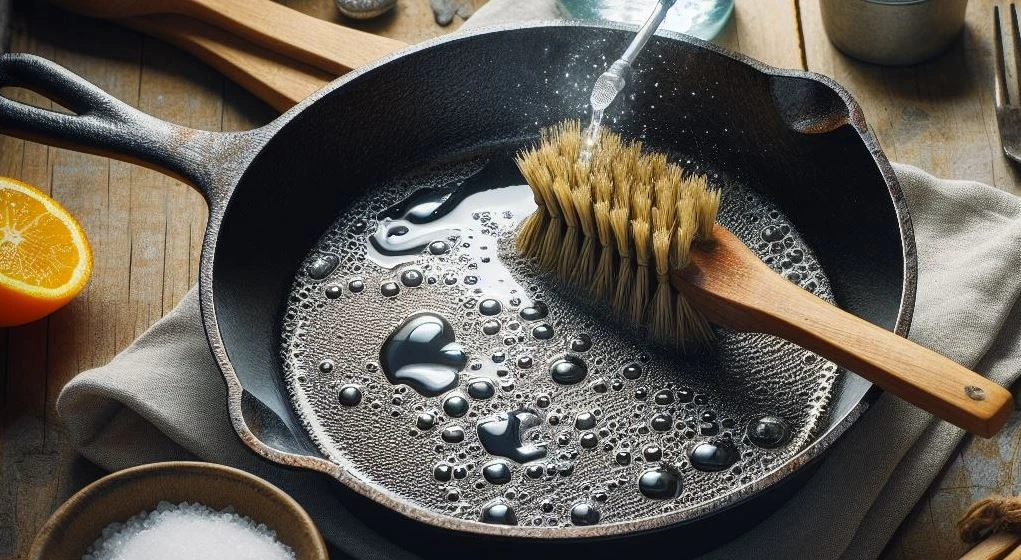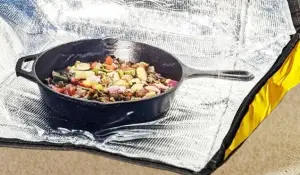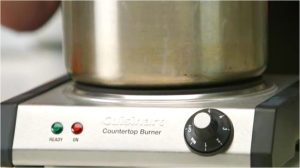Cast Iron Smells: How To Get Rid Of It
Cast iron skillets can develop unpleasant odors for several reasons, including the cooking of pungent foods, improper cleaning, or insufficient seasoning. These smells often arise from food residues, rancid oils, or the formation of ferrous sulfide, a compound of iron and sulfur. To tackle these odors, various home remedies can be effective.
Baking the skillet in the oven at 400 degrees Fahrenheit for about 15 minutes can help eliminate lingering smells. This process burns off residue and rancid oils.
Creating a lemon juice solution can absorb odors while imparting a fresh, citrusy scent. Mix equal parts of water and white vinegar in the pan for a similar effect. The acidic nature of vinegar helps to neutralize odors.
Salt is another great remedy. Filling the pan with kosher salt to a depth of 1/8 inch can absorb odors. Alternatively, washing the skillet with soapy water, followed by a baking soda treatment, can be effective. Baking soda is known for its odor-absorbing properties.
Metallic odors can result from ferrous sulfide or rust formation. In such cases, washing the skillet with soap and hot water, removing any rust, and re-seasoning it can be beneficial.
A salt scrub using water and neutral oil, like canola or vegetable oil, is effective for cleaning and removing smells without damaging the seasoning.
Avoid using harsh chemicals, as they are unnecessary and can harm the pan’s seasoning. Regularly seasoning your cast iron skillet also helps prevent odors by creating a protective layer that minimizes food residue and rust.
If you find the odor of burning oil during seasoning bothersome, try seasoning your skillet outdoors or in a well-ventilated area.
Read Also: Best Steam Canners
Cast Iron Skillet Smells! How to Deodorize?
Cast iron skillets are revered for their durability and versatility in cooking. However, they can sometimes develop distinct odors due to various factors, each requiring specific solutions to deodorize effectively.
1. Cast Iron Skillet Smells Bad
This general unpleasant odor can be due to food residues or inadequate cleaning.
To resolve this, fill the skillet with water and bring it to a boil. The steam helps loosen any stuck food particles. After boiling for a few minutes, let it cool, then scrub with a stiff brush. Dry it thoroughly to prevent rust.
Following this, heat the skillet on the stove to evaporate any remaining moisture. This method is effective in removing general bad smells by addressing their root cause.
2. Cast Iron Pan Smells Rancid
Rancid smells typically originate from oils that have spoiled over time. To combat this, scrub the skillet with a paste made from kosher salt and water.
The abrasiveness of salt aids in scrubbing away the rancid oil without damaging the pan’s seasoning. Rinse thoroughly and then apply a thin layer of fresh cooking oil, heating the skillet lightly to re-season.
This process removes the rancid oil and refreshes the skillet’s seasoning, eliminating the foul odor.
3. Cast Iron Smells Like Chemicals
Chemical smells can occur if the skillet has been exposed to cleaning agents or non-food-grade oils. Wash the skillet with a mild dish soap and warm water, followed by a thorough rinse.
Then, re-season the pan by coating it with a thin layer of cooking oil and baking it in the oven.
This method not only removes chemical residues but also restores the natural, non-toxic seasoning layer, ensuring the skillet is safe for cooking.
4. Cast Iron Smells Like Fish
Cooking fish or other strong-smelling foods can leave a lasting odor. To remove this, create a paste using baking soda and a small amount of water.
Spread this paste over the skillet and let it sit for 15-20 minutes. The baking soda neutralizes the fishy smell.
Rinse the skillet and dry it thoroughly, then lightly coat it with oil and heat it to re-season. This method effectively eliminates odors without harming the pan’s seasoning.
5. Cast Iron Pan Smells Like Metal
A metallic smell often indicates the skillet needs re-seasoning. Scrub the pan with steel wool to remove any rust or old seasoning, then wash and dry it. Coat the skillet with a high-smoke-point oil and bake it in the oven.
This process not only removes the metallic smell but also rebuilds the protective seasoning layer, preventing future metallic odors.
6. Cast Iron Skillet Smells Like Old Oil
Old oil smells are common in skillets not used frequently. Clean the skillet with a mixture of coarse salt and warm water to remove old oil residues.
Rinse, dry thoroughly, and re-season the skillet by applying a thin layer of fresh oil and heating it.
This method effectively removes old oil residues and their associated smells, while reinvigorating the skillet’s seasoning.
7. Cast Iron Skillet Smells Burnt
Burnt smells are usually due to overheating or burning food residues. Scrub the skillet with a mixture of salt and water. The abrasive nature of the salt helps remove burnt residues.
After scrubbing, rinse, dry, and re-season the skillet. This process effectively eliminates burnt smells and restores the skillet’s non-stick surface.
8. Cast Iron Skillet Smells Like Vinegar
A vinegar smell can occur if the skillet has been cleaned with vinegar or acidic foods. Rinse the skillet thoroughly with water, then coat it with baking soda.
After a few minutes, rinse and dry the skillet, then apply a light layer of oil and heat it to re-season.
This method removes the acidic residues that cause the vinegar smell and renews the skillet’s seasoning.
Read Also: Will a Magnet Stick to Cast Iron?
Why Does Cast Iron Smell?
Your cast iron skillet might start to emit a variety of odors due to different factors. It’s essential to identify the cause to effectively eliminate these smells. One primary reason for odor is the buildup of food particles and grease.
When these residues are not thoroughly cleaned, they can spoil and produce unpleasant smells. The use of strong-smelling ingredients like fish or garlic can leave a lingering scent.
Another common issue is the development of rancidity. This happens when the oil used in seasoning the skillet goes bad. Oxidation of fats leads to a distinctive, unpleasant smell.
Moreover, if the skillet is stored in damp conditions, it may develop a musty or metallic smell due to rust formation. Improper seasoning can also contribute to off-odors, as a well-seasoned skillet forms a protective barrier that prevents direct contact with food with iron, thereby reducing the likelihood of metallic smells.
Read More: Brass Burner Vs Cast Iron Burner: Ultimate Cookware Duel
Steps to Eliminate Metallic Taste from Cast Iron
Step 1: Clean Thoroughly
Start by scrubbing your cast iron pan with warm, soapy water and a stiff brush. This step removes any surface rust and food particles that might be causing the metallic taste.
Step 2: Vinegar Soak
If the metallic taste persists, soak the pan in a mixture of equal parts water and white vinegar for an hour. This solution helps to dissolve minor rust that could be contributing to the metallic taste.
Step 3: Rinse and Dry
After the soak, rinse the pan thoroughly with water. It’s essential to dry the pan completely to prevent further rusting. Heat it on the stove or in the oven to ensure all moisture evaporates.
Step 4: Re-season
Apply a thin layer of cooking oil to the entire surface of the pan, including the exterior and handle. Heat the pan in the oven at 350 degrees Fahrenheit for an hour. This process will re-season the pan, creating a protective layer that minimizes metallic taste.
Step 5: Regular Maintenance
To prevent the return of the metallic taste, regularly clean, dry, and oil your cast iron pan after each use. This continuous care maintains the seasoning and prevents rust buildup.
Additional Tips and Tricks for Cast Iron Skillet Odor Removal
Beyond the standard remedies, a few more tips and tricks can help you banish those pesky smells from your cast iron skillet:
Activated Charcoal: Place a few pieces of activated charcoal in your skillet and leave it overnight. Activated charcoal is a natural odor absorber that can work wonders on lingering smells.
Sunbathing: Leaving your skillet out in the sun for a few hours can also help. The sunlight’s UV rays have natural disinfectant properties that can neutralize odors.
Coffee Grounds: Coffee grounds are another excellent natural odor absorber. Fill your skillet with used coffee grounds, let it sit overnight, and then rinse thoroughly. The coffee grounds will absorb the odors, leaving your skillet smelling fresh.
Boiling Potatoes: This might sound unusual, but boiling potatoes in your skillet with water and a splash of vinegar can help remove stubborn smells. The starch from the potatoes can absorb odors, while the vinegar acts as a natural deodorizer.

Preventive Measures for Cast Iron Skillet Odors
Proper Cleaning and Storage
Always clean your cast iron skillet immediately after use. Avoid leaving it soaking in water as this can strip the seasoning and lead to rust. After washing, dry the skillet thoroughly and store it in a dry place. A thin layer of oil before storage can help protect the seasoning and prevent rust.
Seasoning Maintenance
Regular seasoning of your cast iron skillet is crucial. This process involves coating the skillet with a thin layer of oil and heating it to create a natural, non-stick surface. This layer also protects against rust and helps minimize the absorption of odors.
Cooking Practices
Be mindful of the foods you cook in your cast iron skillet. Strongly flavored or acidic foods can impact the seasoning and leave lasting odors. Using the skillet regularly for a variety of foods helps maintain an even seasoning and reduces odor absorption.
Avoiding Harsh Chemicals
Refrain from using harsh detergents or metal scouring pads on your cast iron skillet. These can strip the seasoning and increase the likelihood of rust and odors. Stick to gentle cleaning methods to preserve the skillet’s integrity.





